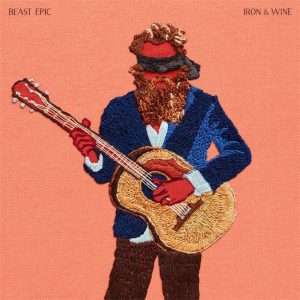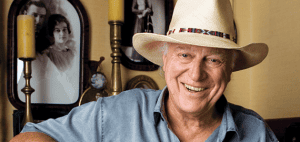Iron & Wine: The 13th Floor Interview
A brand new Iron & Wine album is released today. Beast Epic is the first new material from Sam Beam in four years. During that period, Sam recorded an album with Jesca Hoop and moved his family to Durham, North Carolina.
The 13th Floor’s Marty Duda spoke to Iron & Wine’s Sam Beam about Beast Epic, which was recorded in The Loft, Wilco’s studio located in Chicago.
Click here to listen to the Iron & Wine Interview:
Or, read a transcription of the interview here:
MD: Obviously, the album’s all recorded, because I just heard it yesterday, but it’s not being released until the end of August. What do you do in that interim? Are you just gearing up for the release; that kind of thing?
 SB: Yeah, we’re just waiting, like, wring our knuckles, just sweat, wondering what’s going to happen. I’ve got rehearsals, next month, with a new band, which I’m really excited about – it’s a five piece band. It’s always fun, with a bunch of old songs, to have a new band to reinterpret things; it’s always fun.
SB: Yeah, we’re just waiting, like, wring our knuckles, just sweat, wondering what’s going to happen. I’ve got rehearsals, next month, with a new band, which I’m really excited about – it’s a five piece band. It’s always fun, with a bunch of old songs, to have a new band to reinterpret things; it’s always fun.
MD: Who do you have in the band?
SB: Well, funny that you asked: we have a bass player…two people that played on the record, this guy Sebastian Steinberg – who’s a bass player that I’ve been playing with… – and then Teddy is going to be playing the cello, because I really liked the way they spoke between the guitar – the bass and cello… were really fun – and then there is a new drummer named Beth Goodfellow, and a new piano player named Eliza; so, a little five piece.
MD: The album itself is recorded in Chicago; is that right; at The Loft?
SB: Yeah, we did it at the Wilco Loft, which was fun, because Jeff (Tweedy) has a lot of toys to make a record with; and it’s real cosy, and there’s just a lot of old friends.
MD: I don’t have any credit list as who played on the album…
SB: Sebastian and Teddy were there – the fellows that I was just telling you about – and then some people that I’ve been playing with for a long time as well: Rob Burger was playing the keys, and Joe Adamik was on the drums – and he plays a bunch of different things, like the bass, clarinet, and a lot of other things – and Jim Becker – who I play with a bunch – anything with strings on it, he’ll play; and I think that was it….
MD: From what I’ve read in the little blurb that came with it, this is more of a ‘back to basics’ production: things recorded live in the studio, not quite such elaborate production as you had done in the past; is that right?
SB: Yeah. I did a couple of collaborative records in between, but the last Iron & Wine – just by myself – thing, was a pretty large affair. I always liked string sections and horn sections, and things; and so, it wouldn’t be difficult to be more open and simplified. You couldn’t get much larger; so, smaller was easy. It was a bit more loose and improvisational, in a fun way. I’ve been playing with a lot of jazz players, but we’re playing folk music; and so, it has a lot of kinship with some of the older Van Morrison or John Martyn, or even Roberta Flack and Nina Simone: they played a lot of jazz, but they were playing folk music a lot of the time. It has this interpretive and expressive quality that I really like, and the arrangements are open; so, all the takes are very different. It was a lot of fun. We actually had a ball making it.
MD: That’s always important! Was it something about the particular batch of songs that you had, that made you want to approach the recording that way, or was it in reverse: you adjusted the songs to fit the mindset of the recording sessions?
SB: Ah, no… It was just intuitive, really. They both happened to work at the same time. I was enjoying playing that way at home – just playing more acoustic guitar – and the songs that I was working on were a bit more contemplative. They just seemed to work…. They felt introspective; and so, it all just ‘dovetailed’ nicely, serendipitously.

MD: You mentioned that you’d done some collaborative things before this record; one of them being the one you put out with Jesca Hoop. Did those collaborations have any effect on what you’re doing now?
SB: Yeah, they definitely did. I mean, the record I’d made with Jess, was the first record I’d ever written. I mean, I’d played with lots of other people and collaborated that way musically with a lot of other people… but I’d never written songs with other people; and so, there was a lot of letting go, and enjoying the process of making: rather than concentrating on the final result, there was a lot of letting go, and letting chance and things happen, and just enjoying the possibility of what might happen. That definitely came into play, with this record. I went into it with much less of an idea of what I wanted to hear by the end. My agenda was a bit different, in the sense that on the last couple of records… I’ve been trying to push myself in some recognisable but also unfamiliar territory, and this one was just, “Let’s see what happens; do what we do, and see what happens.” I think that part of that came from collaborating, also recognising my voice again, instead of trying to put it in some other sonic space; it’s just enjoying my voice for what it does effortlessly, and let everything else around it create variety, instead of the opposite. It was fun.
MD: Is this the first Iron & Wine album you’ve done since you moved to North Carolina?
SB: Yeah, the first Iron & Wine without anyone else on the spine with me.
MD: Because, you were living in Florida before that, right?
SB: I was in Florida for a while, and then I was in Texas for about a decade, and then we moved back to the East Coast. Yeah, it’s been nice.
MD: Is there a music scene in Durham that we don’t know about, or that we should know about?
SB: There probably is! I’m not so sure about it either – I’m kind of a home-body – but at the same time, it’s a pretty hip place, they say.
MD: You’ve also moved back to Sub Pop, from being – for a brief time – on a major Warners and Nonesuch. In this day and age, is there that much of a difference between being on one or the other?
SB: It depends on what situation you’re in. I think if you’re starting out, there are pros and cons to a smaller label, and there are also pros and cons to a larger label: their promotional pockets are a bit deeper, and that can be really important when you’re fighting for attention; but… I really enjoy working at Nonesuch – they’re really talented and really interesting people; they’re good friends – but, as far as business for me, I’ve felt like Sub Pop were always friends too, and I was looking forward to working with them some more – they have the back catalogue – and it was a fun reunion. I’ve always enjoyed autonomy, and I think Sub Pop allows me a bit more autonomy than I was able to do otherwise…
MD: I was hoping we could talk a little bit about the actual songs and music that are involved in the record. One thing I noticed… is that there are quite a few lyrical references that are religious references, and I was wondering if that is unique to this record, or do you look at that as an element that you intersperse throughout all of your music, or is there a reason that it’s here now?
SB: It’s an element that I’ve used, consistently, over the years. I feel like it’s a big part of the culture. I write songs that I hope people from all over the world can enjoy, but, as a writer, you have to know where the people that you’re writing about, where the story is taking place, specifically; and so, they’re American voices, and it’s a huge part of the culture here – whether you’re on one side of the fence or another, it’s part of the culture. I also grew up in the Bible Belt – they call it the Bible Belt: it’s like the southeast part of the country – and so, it was a big part of my upbringing, and how I understood the culture…. Sometimes, my hat tips further than other times, but I usually just use it as fodder for where these people are at, or how they see the world. I feel like it’s an interesting way to include back story, also, because these stories are very loaded – Biblical characters are super loaded imagery. It’s a way to move away from just some narrator talking about their feelings; it becomes very different, loaded imagery.
MD: Do you worry about any kind of backlash when you make references to “Jesus and his trophy wives”, or things like that?
SB: [Laughter] Not yet. You know, Jesus had some beautiful trophy wives; you see them all the time.
MD: One of the songs that stood out, for me, was Bitter Truth.
https://www.youtube.com/watch?v=d6zNr8s_ETE
SB: Oh yeah! Thanks.
MD: You’re welcome. It seems to be about some kind of broken relationship, and you mentioned the process of possibly getting even in a song. I was wondering if you would care to elaborate on what was behind that song?
 SB: Err, sure…. Oddly enough, I was at South by South West one year, doing a radio show with Jerry Jeff Walker – the guy that wrote Mr. Bojangles – and he was, just as an aside, described some song as a “getting even” kind of song, and I was like, “Oh yeah! Put that in my pocket.” That was years ago, and it just popped up in this song; just that idea there are so many songs out there, where you can say things that you want to, without fear of repercussion, because you’ve got the microphone! I just enjoyed that line; so, it made its way into a song. But yeah, it’s exactly like what you were saying: some relationship has gone sour, and the narrator has a freedom to say that kind of thing, but, actually, at the same time, the… content – call it for what it is – is just me saying because I had the mic.
SB: Err, sure…. Oddly enough, I was at South by South West one year, doing a radio show with Jerry Jeff Walker – the guy that wrote Mr. Bojangles – and he was, just as an aside, described some song as a “getting even” kind of song, and I was like, “Oh yeah! Put that in my pocket.” That was years ago, and it just popped up in this song; just that idea there are so many songs out there, where you can say things that you want to, without fear of repercussion, because you’ve got the microphone! I just enjoyed that line; so, it made its way into a song. But yeah, it’s exactly like what you were saying: some relationship has gone sour, and the narrator has a freedom to say that kind of thing, but, actually, at the same time, the… content – call it for what it is – is just me saying because I had the mic.
MD: Part of the album has a very pastoral vibe and sound to it, and then I got to track seven, which is called Last Night, which seems to have a more – for want of a better word – angular sound to it, and this interesting string intro. What’s going on there?
https://www.youtube.com/watch?v=keuvC6V0i3I
SB: It just came out of a jam. It almost sounds like a crooner torch song, but at the same time, the arrangement is so – like you say – angular and textural, and more like John Cage playing like Sammy Cahn, or something. I love those kinds of juxtapositions and contradictions. I like singing melodies that you can sing without anything – do the singing accapella – but then, once you decide, “I’m going to do this stranger thing up underneath it, to support it,” it casts everything that you sing, on top of it, in a certain light; and I like putting in them strange atmospheres. It’s not like really avant-garde music – it’s really pleasant to hear – it’s just… not what you hear all the time. I like that kind of stuff.
MD: There are a couple of songs that seem to be written about specific places: Thomas County Law and About a Bruise…
SB: Thomas County Law is about the character rejecting his origins. Thomas County is a made up place, just the same way I have a song called Sodom, South Georgia, from a long time ago. It’s another fictional place, but it’s the idea of the place. Once you describe certain kinds of things, I think people that are familiar with that kind of place, will recognise the idea.
MD: I love that line, “Every traffic light is red when it tells the truth,” it’s fantastic!
SB: Yeah, there’s not a lot of options there; but, at the same time, About a Bruise is the opposite: It uses a very specific place. Mobile, Alabama is a specific place on the map, where you can go, and you can see where these made up people did these made up things, and it gives them a weight; and so, it’s a similar use, but at the opposite end of the spectrum.
Iron & Wine’s Beast Epic is out today on Sub Pop
- New Music Friday: 13th Floor New Album Picks: April 26, 2024 - April 26, 2024
- Psycho Gab Perform Gabben at The 13th Floor: Singles Session - April 26, 2024
- Anna Coddington – Kātuarehe: 13th Floor New Song Of The Day - April 26, 2024
